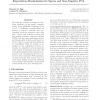Free Online Productivity Tools
i2Speak
i2Symbol
i2OCR
iTex2Img
iWeb2Print
iWeb2Shot
i2Type
iPdf2Split
iPdf2Merge
i2Bopomofo
i2Arabic
i2Style
i2Image
i2PDF
iLatex2Rtf
Sci2ools
112
click to vote
ICML
2008
IEEE
2008
IEEE
Expectation-maximization for sparse and non-negative PCA
We study the problem of finding the dominant eigenvector of the sample covariance matrix, under additional constraints on the vector: a cardinality constraint limits the number of non-zero elements, and nonnegativity forces the elements to have equal sign. This problem is known as sparse and non-negative principal component analysis (PCA), and has many applications including dimensionality reduction and feature selection. Based on expectation-maximization for probabilistic PCA, we present an algorithm for any combination of these constraints. Its complexity is at most quadratic in the number of dimensions of the data. We demonstrate significant improvements in performance and computational efficiency compared to other constrained PCA algorithms, on large data sets from biology and computer vision. Finally, we show the usefulness of non-negative sparse PCA for unsupervised feature selection in a gene clustering task.
Constrained Pca Algorithms | ICML 2008 | Machine Learning | Non-negative Sparse PCA | Probabilistic Pca |
| Added | 17 Nov 2009 |
| Updated | 17 Nov 2009 |
| Type | Conference |
| Year | 2008 |
| Where | ICML |
| Authors | Christian D. Sigg, Joachim M. Buhmann |
Comments (0)

